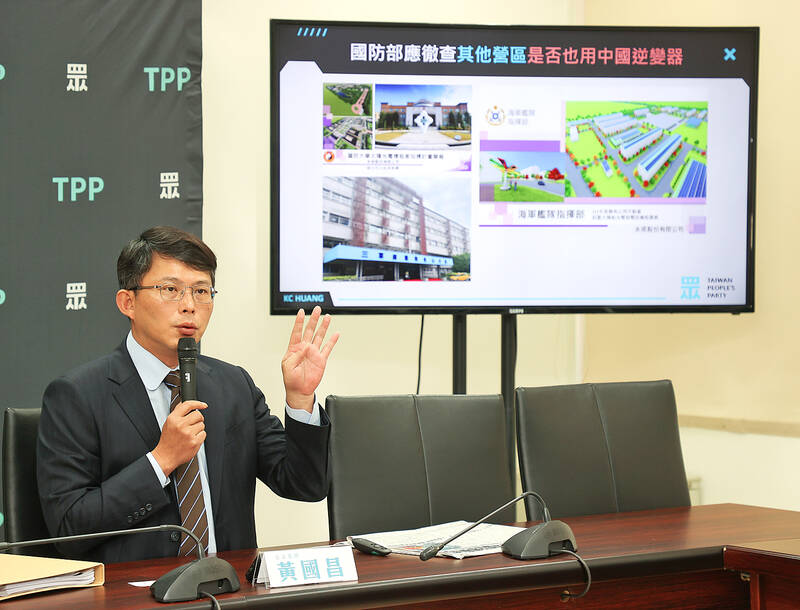Taiwan People’s Party (TPP) Legislator Huang Kuo-chang (黃國昌) yesterday said that Yongliang Ltd (永梁) had contravened the law by using China-made photovoltaic inverters in a military complex and called for a general inspection of military bases to see if there are other similar breaches.
The Legislative Yuan was criticized in 2017 for installing a photovoltaic inverter that had been made in China, Huang told a news conference in Taipei.
Democratic Progressive Party Legislator Tsai Yi-yu (蔡易餘) and others have launched a campaign to ban the use of equipment made in China to protect national security.

Photo: CNA
United Renewable Energy Co (聯合再生), the parent company of Yongliang, was founded with a NT$3 billion (US$92.15 million) investment from the National Development Fund, and yet it is using equipment manufactured in China in a military base, Huang said yesterday.
Huang showed Yongliang’s contract to lease land from the army’s Lanyang Regional Command Center and said the contract specifically said no machinery manufactured in China was to be used there.
He said he had visited the site and found that all 44 photovoltaic inverters installed at the center have the words “Made in China” on them.
United Renewable Energy issued a statement yesterday saying that purchasing photovoltaic inverters from a German company that had them assembled in China was an “error” stemming from a lack of proper management.
The company pledged to put forward proposals to swap out the equipment using 100 percent Taiwan-made equipment within three days, adding that with the Ministry of National Defense’s approval, it would make the changes as soon as possible.
Mistakes were made and the military would strive to do better, Major General Huang Chien-sheng (黃建勝), director of the Armaments Bureau’s Construction and Production Division, said in a statement.
Such incidents are not allowed, and the ministry has launched a general inquiry, Huang Chien-sheng said.
Major General Lin Chia-yao (林佳耀), director of the Army Command Headquarters’ Engineering Division, said that the command has demanded Yongliang swap out all of the equipment before July 26.
If the company failed to facilitate the swap within the given time, the army would terminate the contract, Lin said.
The army is also reviewing relevant procedures, Lin added.

FORCED LABOR: A US court listed three Taiwanese and nine firms based in Taiwan in its indictment, with eight of the companies registered at the same address Nine companies registered in Taiwan, as well as three Taiwanese, on Tuesday were named by the US Department of the Treasury’s Office of Foreign Assets Control (OFAC) as Specially Designated Nationals (SDNs) as a result of a US federal court indictment. The indictment unsealed at the federal court in Brooklyn, New York, said that Chen Zhi (陳志), a dual Cambodian-British national, is being indicted for fraud conspiracy, money laundering and overseeing Prince Holding Group’s forced-labor scam camps in Cambodia. At its peak, the company allegedly made US$30 million per day, court documents showed. The US government has seized Chen’s noncustodial wallet, which contains

SUPPLY CHAIN: Taiwan’s advantages in the drone industry include rapid production capacity that is independent of Chinese-made parts, the economic ministry said The Executive Yuan yesterday approved plans to invest NT$44.2 billion (US$1.44 billion) into domestic production of uncrewed aerial vehicles over the next six years, bringing Taiwan’s output value to more than NT$40 billion by 2030 and making the nation Asia’s democratic hub for the drone supply chain. The proposed budget has NT$33.8 billion in new allocations and NT$10.43 billion in existing funds, the Ministry of Economic Affairs said. Under the new development program, the public sector would purchase nearly 100,000 drones, of which 50,898 would be for civil and government use, while 48,750 would be for national defense, it said. The Ministry of

SENATE RECOMMENDATION: The National Defense Authorization Act encourages the US secretary of defense to invite Taiwan’s navy to participate in the exercises in Hawaii The US Senate on Thursday last week passed the National Defense Authorization Act (NDAA) for Fiscal Year 2026, which strongly encourages the US secretary of defense to invite Taiwan’s naval forces to participate in the Rim of the Pacific (RIMPAC) exercise, as well as allocating military aid of US$1 billion for Taiwan. The bill, which authorizes appropriations for the military activities of the US Department of Defense, military construction and other purposes, passed with 77 votes in support and 20 against. While the NDAA authorizes about US$925 billion of defense spending, the Central News Agency yesterday reported that an aide of US

UNITED: The other candidates congratulated Cheng on her win, saying they hoped the new chair could bring the party to victory in the elections next year and in 2028 Former Chinese Nationalist Party (KMT) lawmaker Cheng Li-wun (鄭麗文) yesterday won the party’s chair election with 65,122 votes, or 50.15 percent of the votes. It was the first time Cheng, 55, ran for the top KMT post, and she is the second woman to hold the post of chair, following Hung Hsiu-chu (洪秀柱), who served from 2016 to 2017. Cheng is to succeed incumbent Eric Chu (朱立倫) on Nov. 1 for a four-year term. Cheng said she has spoken with the other five candidates and pledged to maintain party unity, adding that the party would aim to win the elections next year and